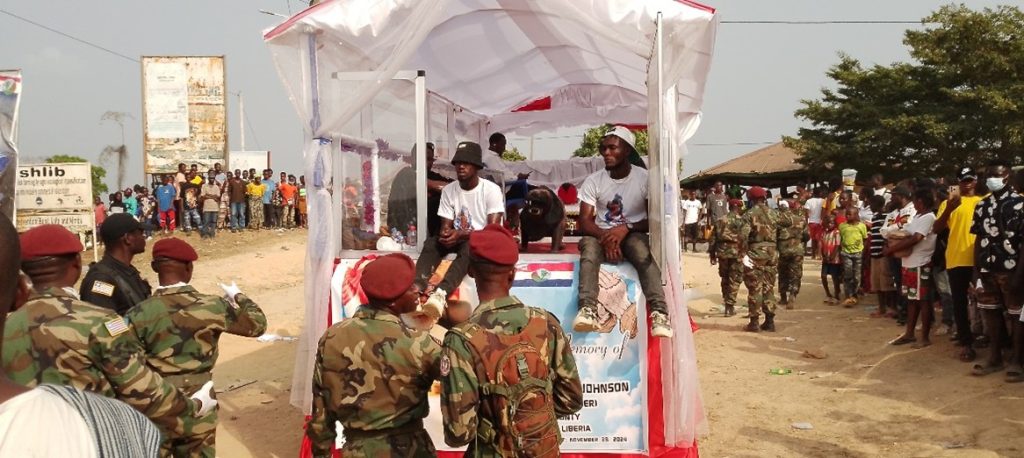The Liberian government is implementing heightened security measures, including the deployment of armed personnel, at the designated burial site of the late Senator Prince Yormie Johnson in Nimba County. This action comes in response to circulating rumors suggesting a plot by unidentified individuals to exhume the senator’s remains after his interment scheduled for Saturday, January 18, 2025. The alleged motive behind this potential grave desecration stems from the unresolved history surrounding the death of former President Samuel K. Doe, who was captured, tortured, and killed by forces under Johnson’s command during the Liberian Civil War. These individuals argue that Doe, despite his violent end, does not have a marked grave, and therefore, Johnson, whom they hold responsible, should not be afforded the dignity of a proper burial or memorial.
The late Senator Johnson, a controversial figure in Liberian history, led the Independent National Patriotic Front of Liberia (INPFL) during the civil war. His forces were responsible for capturing President Doe at the Freeport of Monrovia in 1990, subsequently leading to Doe’s brutal execution. The incident, captured on video, remains a stark reminder of the war’s atrocities. Following this act, Johnson’s own base was overtaken by Charles Taylor’s National Patriotic Front of Liberia (NPFL), forcing Johnson to seek refuge with ECOMOG peacekeepers, who subsequently granted him exile in Nigeria. He later returned to Liberia, transitioning from warlord to politician, eventually serving as a senator.
Johnson’s body was transported to Ganta, Nimba County, on Thursday, following a lying-in-state ceremony at the Capitol Building in Monrovia. Dignitaries, including Vice President Jeremiah Kpan Koung, fellow senators, and other government officials, paid their respects. President George Manneh Weah and former President Ellen Johnson Sirleaf also signed the Book of Condolence, acknowledging Johnson’s role in Liberian political life. The arrival of his remains in Nimba County was met by a large gathering of his kinsmen, who view him as a hero for his actions against Doe’s regime, which they accuse of persecuting Nimbaians.
Before his burial, a procession carrying Johnson’s body is planned through several towns in Nimba County, including Sanniquellie, Karnplay, Bahn, and Saclepea. The final resting place will be his private residence in the LPRC Community of Ganta, a location that also houses the PYJ Polytechnic University and a mineral water facility established by the late senator. This decision, however, has sparked concern among public health officials, who advise against home burials due to potential health risks. Despite these concerns, the government appears to be respecting the family’s wishes.
The security presence in Nimba County has been significantly reinforced since the arrival of Johnson’s body, with the Armed Forces of Liberia playing a prominent role. This heightened security is a direct response to the rumors of potential grave desecration, highlighting the volatile nature of the situation and the lingering tensions surrounding Johnson’s legacy. The government’s commitment to securing the burial site underscores the seriousness of the threat and the importance of preventing any actions that could further inflame existing societal divisions.
The planned burial of Senator Prince Johnson has brought to the forefront the complexities of Liberia’s past and the enduring impact of the civil war. The controversy surrounding his final resting place, juxtaposed with the absence of a marked grave for former President Doe, highlights the unresolved grievances and the need for national reconciliation. The government’s decision to deploy armed security reflects the fragility of peace and the continued potential for unrest stemming from historical injustices. The events surrounding Johnson’s burial serve as a stark reminder of Liberia’s challenging journey toward healing and lasting peace.














